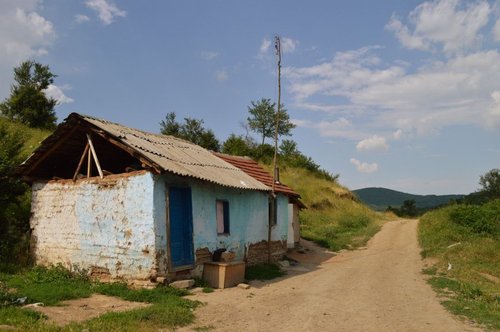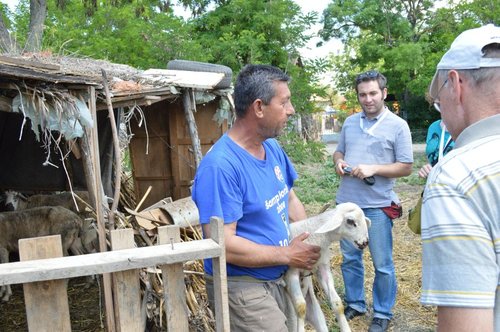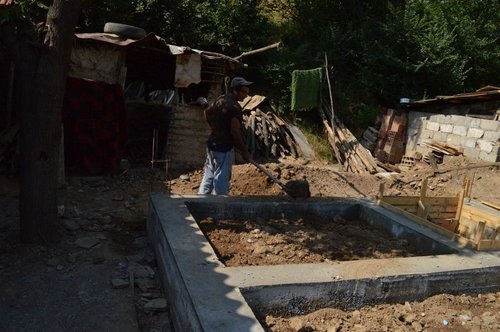Steps Toward Social Inclusion
2014. július 02., szerdaThe Swiss Interchurch Aid (HEKS) Regional Partner Meeting of Eastern Europe and Western Balkans was organised in Kosovo and Serbia on inclusion of Roma, Ashkali and Egyptians at the beginning of June 2014. The Reformed Church in Hungary, as a partner organization of HEKS since September 2013, was represented by the Roma Mission Office of the General Synod's Mission Department.
For the first time in the history of HEKS, regional meetings, not the desk officers of the different regions, met in Zurich and discussed the challenges of their own fields. This time the opportunity was given to the partner organizations from the different countries (Albania, Kosovo, Serbia, Romania and Hungary) to meet, visit projects and exchange.
HEKS history in the region and in Hungary
HEKS is present in the Western Balkans since 2009 with development projects covering different fields. For Hungary, the Interchurch Cooperation programme (KiZA) was elaborated in 2012. In 2013, HEKS has approved its own Regional Thematic Programme for Eastern Europe and Western Balkans, focusing on Roma inclusion with different thematic issues: sanitation and housing up-grades, employment and income, advocacy and empowerment, development of social services and education.
The HEKS Country Programme 2014-2016 for Hungary has been developed in partnership with the Hungarian Reformed Church and is realized within the reformed congregations’ Roma mission projects with a large focus on the education and social inclusion issues. For the Roma Mission Office, the meeting was a great opportunity to visit other thematic missions and exchange about different institutionalizing project components, even the RCH profile is not linked closely to development work.

For the first 3 days, the host institution was Voice of Roma, Ashkali and Egyptians (VoRAE) from Gracanica, Kosovo who organized mainly field visits for the participants in Fuche Kosove and Gadime Settlement. The rest of the meeting was held in Novi Sad, Serbia, in the Ecumenical Humanitarian Organization’s (EHO) headquarter, where debriefings of the visits, workshops on thematic issues and meetings with guests were organized.
Host organizations
VoRAE (1998), initially providing humanitarian assistance to the Roma community, switched its focus to education, employment and improvement of infrastructure in Roma settlements parallel with the changes in society. In the different fields the capacities of the staff have continued to grow, specific approaches have been developed making today’s VoRAE a leading Roma led organization in Kosovo.
EHO (1993) is an interchurch development organization with activities in the area of interethnic and inter-religious cooperation, social inclusion of the Roma community. The organization brings the necessary expertise and experience in the field of housing, basic and vocational education, advocacy, lobbying and capacity building, ensuring that EHO is a leading, reliable agency to take over comprehensive programmes for assisting state, Roma CSOs and Roma national community in Serbia.
Field visits – housing up-grades, income generation and education programmes
The concept behind the visited house up-grading projects is a resident-driven model recognized as a part of VoRAE Roma housing strategy, imported from EHO Serbia a few years ago. As Roma housing settlements hygienic conditions (drinking water, toilets and sewage) are extremely bad in Kosovo, the projects allow families to access sewage and water systems and they then can construct for themselves bathrooms with running water and/or an annex to an existing house as well. The work is always executed in 11 phases controlled step by step by professionals. The contribution of the families is a crucial point of the model: half the cost of the recycled building materials is financed by the families and the construction work is entirely based on their work-force.

The income generating projects focus on creating job opportunities for Roma excluded from the labour market, either by supporting self-employment through technical assistance and improving access to microfinance institutions or through vocational education, advocacy and networking with companies and state institutions. The visited projects are self-run businesses like sheep tending, waste management, beauty salons, construction companies and strawberry farms where the project investment amount varies from 500 to 3,000 EUR. Families must contribute 30% - 50% of the project cost. The main challenge is that the families tend to spend the profits for consumption and rarely invest in further development as the lack of business plans or close follow up from the organization.
The education centers (EC) run by VoRAE offer afternoon homework assistance and enhance language skills of Roma, Ashkali and Egyptian school-aged children. Since ECs are hosted in public school buildings, this service is accessible to Albanian and Serbian children as well. This solution provides a heterogeneous learning opportunity for children and at the same time facilitates the coordination of tutors work with school staff and parents as well.
Workshops
One of the main objectives of the meeting was to explore and discuss possible approaches to scale up and institutionalize working project models fostering systemic change. Discussions were held around different types of support, grant-giving and/or facilitating access to loans and employment by simultaneously providing more technical support and capacity building. It leads already to a principle, defined by the participants, the community based approach, giving more ownership and responsibility to Roma in development work.
The up-scaling process includes exploring new fundraising possibilities beyond EU grants and international donors. Even the indicators and budget of the projects led by VoRAE or EHO are already impressive, a further challenge is to ensure co-funding from the state and according to the project type find the ways to implement project elements in public services.

Guest from international organizations and the Serbian state board were invited as well to enrich the discussion of the up-scaling workshops by giving an insight on EU, Swiss or Serbian inclusion policies. The Roma Education Fund (REF) and Making the Most of EU Funds for Roma (MtM) established by the Open Society Institute (OSI) are two Budapest-based organisations whose activities are closely related to the Decade of Roma Inclusion. REF is working on closing the gap in education between Roma and non-Roma while MtM is an instrument to connect the Decade of Roma Inclusion objectives to EU financial resources. They are operating in the countries of all partner organizations. The desk officer of Swiss Development Cooperation (SDC) was invited as well to present the principles of SDC in the field of Roma inclusion. The state point of view was also shared by a deputy manager on the Serbian context where the state is facing the most severe EU demands on inclusion issues with its 2nd Roma Strategy within 5 years in the framework of the integration process.
Other objectives of the meeting were to explore synergies on different partner's field activities and to foster future knowledge sharing. This remains an on-going process, based on the partners' related action-plans worked out on the last day. For the RCH's Mission Department, cooperation with Diakonia Cluj, FAER in Romania and EHO in Serbia promises to be a valuable cooperation in the future due to the socio-cultural similarities regarding the challenges in Roma inclusion, not to mention the favourable geographical disposition as well. The community based approach which is the strength of the Roma mission projects led by reformed congregations is to be monitored, developed and shared with the partner organizations.
Laura Velkey
Contact us
Click here if you are interested in twinning.
Reformed Church in Hungary
Address: H-1146 Budapest, Abonyi utca 21.
PO Box: 1140 Budapest 70, Pf. 5
Email: oikumene@reformatus.hu
English, German and Korean language services in Budapest
Links
Recommended articles
-
Pastoral Letter in the Light of the Pandemic
Bishop Dr. István Szabó sent a pastoral letter of encouragement to the ministers serving in RCH’s congregations, expressing his gratitude for the persistence and creativity of the pastors.
-
RCH Joins in Pope's Call for Prayer
RCH published the call on congregations to join the initiative of Pope Francis, supported by ecumenical organisations, to unite in praying the Lord’s Prayer on Wednesday, 25 March, at noon.
-
English Speaking Worship Services Online
Each Sunday at 11 AM (CET) the St. Columba's Church of Scotland in Budapest, the international community of RCH invites you to join the worpship service on its facebook page.
-
Test of Humanity and Companionship
Reformatus.hu asked Dr. György Velkey, Director General of the Bethesda Children’s Hospital of RCH about the challenges of health care workers and ways of prevention against the pandemic.
-
All Church Events Suspended
In light of the coronavirus the Presidium of RCH requested congregations to suspend all church events with immediate effect. Beside restrictions, it calls for prayer, sobriety and responsibility.











